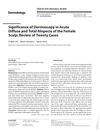 24 citations,
November 2017 in “Aesthetic Plastic Surgery”
24 citations,
November 2017 in “Aesthetic Plastic Surgery” All types of Platelet-Rich Plasma (PRP) can treat hair loss, but homologous PRP works best due to its higher platelet count and growth factors from multiple donors.
August 2024 in “International Journal of Molecular Sciences” Mesenchymal Stem Cell therapy shows promise for treating hair loss in Alopecia Areata.
 January 2019 in “Springer eBooks”
January 2019 in “Springer eBooks” Some chemicals and drugs can cause hair loss, which usually grows back after stopping the treatment.
 July 2011 in “British Journal of Dermatology”
July 2011 in “British Journal of Dermatology” Hormone treatment caused hair loss, finasteride helped regrowth.
 6 citations,
April 2017 in “Experimental dermatology”
6 citations,
April 2017 in “Experimental dermatology” CD80CD86 deficiency causes hair loss by disrupting regulatory T cells.
 21 citations,
July 2014 in “British Journal of Dermatology”
21 citations,
July 2014 in “British Journal of Dermatology” Hair thickness matters more than density for baldness in Japanese men over 25.
 165 citations,
August 2013 in “Lasers in Surgery and Medicine”
165 citations,
August 2013 in “Lasers in Surgery and Medicine” Low-Level Laser Therapy is effective and safe for hair growth with minimal side effects.
53 citations,
January 2013 in “Journal of toxicologic pathology” The project created a standardized system for classifying skin lesions in lab rats and mice.
 January 2024 in “Frontiers for young minds”
January 2024 in “Frontiers for young minds” Alopecia is a condition causing hair loss that can impact looks and mental health.
 8 citations,
January 2015 in “World Journal of Gastroenterology”
8 citations,
January 2015 in “World Journal of Gastroenterology” Hair loss is common in IBD patients, and some medications may lower the risk.
 125 citations,
May 2007 in “Journal of The American Academy of Dermatology”
125 citations,
May 2007 in “Journal of The American Academy of Dermatology” The BASP classification is a detailed and accurate way to categorize hair loss in both men and women.
 September 2023 in “JPRAS Open”
September 2023 in “JPRAS Open” Botulinum Toxin A may help with hair growth and has some side effects; more research is needed.
 May 2003 in “Facial Plastic Surgery Clinics of North America”
May 2003 in “Facial Plastic Surgery Clinics of North America” Hair loss can be treated with medications like minoxidil and finasteride or surgery, but treatment effectiveness varies by alopecia type and accurate diagnosis is important.
3 citations,
August 2022 in “Molecules/Molecules online/Molecules annual” A new strain of bacteria from the human skin can help prevent hair loss.
 1 citations,
January 2022 in “Transgender health”
1 citations,
January 2022 in “Transgender health” Hormone therapy in transgender individuals can increase acne and affect hair growth and loss.
 2 citations,
January 1908 in “Journal of the American Medical Association”
2 citations,
January 1908 in “Journal of the American Medical Association” Fear of hair-related issues causes significant mental distress, especially in high-stress women.
 242 citations,
February 2016 in “Science”
242 citations,
February 2016 in “Science” Hair loss and aging are caused by the breakdown of a key protein in hair stem cells.
 42 citations,
January 2008 in “Dermatology”
42 citations,
January 2008 in “Dermatology” Dermoscopy effectively distinguishes between acute total hair loss and other types of female hair loss.
 May 1994 in “Reactions Weekly”
May 1994 in “Reactions Weekly” Many medications can cause hair loss or excessive hair growth, which is usually reversible after stopping the drug.
 15 citations,
October 2016 in “Journal of The European Academy of Dermatology and Venereology”
15 citations,
October 2016 in “Journal of The European Academy of Dermatology and Venereology” People with hair loss have worse cholesterol levels, possibly linking hair loss to heart problems.
1 citations,
April 2024 in “Journal of Drug Delivery Science and Technology” Microneedles combined with conventional therapies show promise in treating alopecia areata.
 July 2022 in “Journal of Investigative Dermatology”
July 2022 in “Journal of Investigative Dermatology” The conclusion suggests that a new system for measuring hair loss could be created using automated analysis of photographs.
 January 1997 in “Elsevier eBooks”
January 1997 in “Elsevier eBooks” The document explains how shampoos clean, rinses condition, one-step shampoos offer convenience, and hair growth promoters aim to prevent hair loss, emphasizing the importance of scientific evidence for their effectiveness.
 10 citations,
January 2008 in “PubMed”
10 citations,
January 2008 in “PubMed” Hair transplantation is a safe, outpatient procedure for restoring hair in individuals with pattern hair loss or certain types of scarring, requiring a trained physician and team, with ongoing medical treatment recommended.
 19 citations,
February 2018 in “Lasers in Medical Science”
19 citations,
February 2018 in “Lasers in Medical Science” Red light and LED treatments help hair grow by activating a specific cell signaling pathway.
 77 citations,
March 2001 in “Clinics in Dermatology”
77 citations,
March 2001 in “Clinics in Dermatology” Androgenetic alopecia involves genetics, hormones, and can be treated with medications or surgery.
 August 2016 in “Journal of Dermatology”
August 2016 in “Journal of Dermatology” A chemical called 5-Bromo-2′-deoxyuridine caused rapid hair loss in mice by killing certain skin cells through a specific cell death pathway.
 2 citations,
April 1981 in “International Journal of Dermatology”
2 citations,
April 1981 in “International Journal of Dermatology” No treatment reliably changes Alopecia Areata's course; reassurance and possibly a wig are recommended.
 100 citations,
April 2010 in “Expert Opinion on Pharmacotherapy”
100 citations,
April 2010 in “Expert Opinion on Pharmacotherapy” Hair loss in men treated best with early medication or transplant, new treatments researched.
 1 citations,
January 2002 in “Dermatology + psychosomatics”
1 citations,
January 2002 in “Dermatology + psychosomatics” Most people worried about abnormal hair loss actually have psychological issues like depression or anxiety.

























